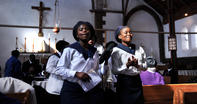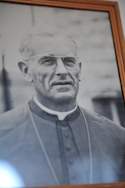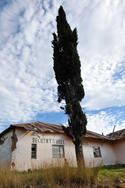Respected Figure

My father was a very respected figure in the community, because he was a teacher and he did so much to help others. He used to give some of the vegetables from our fields to the poor, the widows in our village and women whose husbands were away, working in the mines in Johannesburg.
He also trained our local boy scouts and girl guides and taught dance lessons at the local school. Whenever there was a dance in the community hall, it was my father and his beautiful big red and blue gramophone that provided the music.
A few days ago, I had a nostalgic conversation and a bit of a laugh with Mandisa Mendi, one of the women who come to Grandmothers Against Poverty and Aids. She grew up in the same village as me and was remembering how she used to wind up the gramophone for my father at the dances.
Reverend Weaver

My father was the head of our local Anglican church, St Mark's, which was the cornerstone of our lives in the village. It was the only such church far and wide, and our village was named after it. A white man, the Rev Weaver, was the minister and used to visit on horseback, to preach.
My father helped Rev Weaver to collect people from the darkness, persuading them to come to church to hear the Bible stories; and to release their children from all their tasks at home, so they could go to school to be educated. They used to go around the location talking to people, and talking to the children wherever they found them.
Whenever Rev Weaver came to preach at St Mark's, he would arrive at our house on his horse and come to stay. He first came when I was about 12. He was young and tall, with dark hair, a very good man, and he impressed me deeply. In those days black people hardly ever saw whites because they never came to our locations, so it was very strange to have this white person coming to our house.
People used to ask, 'Why do you let him sleep at your home? There is a hotel for white people. Why doesn't he just go there?' But Rev Weaver used to say to my father, 'I can't go to a hotel. I want to commit myself to black people and sleep in your home.' And it was very good.
Part of the Family

Reverend Weaver had his own bedroom in our house, a whitewashed room with a new bed and new curtains. We never slept there, even though he only came to St Mark's about once a month. The room was reserved just for him. Whenever he came, my father sent us to the shops on our bicycles to buy meat to celebrate and we ate it with the vegetables from the garden. He ate with us at our dining room table.
This was the only time we used the dining room because it was kept for extremely special occasions. When the Rev Weaver was not with us, my sisters and I would eat from one bowl, passing it around the circle of girls, and the boys would do the same, in the traditional way. When we finished supper, the children collected all the bowls or plates without being asked and washed them and swept the floors.
When the floors needed polishing, we would polish them too. The reason for this is that if you don't give children work, they will go around the locations and get into trouble. The reverend was learning isiXhosa and by the time he left us he spoke very well, but when we were around the table, we spoke English. He spoke to us all, even the children. He loved the children very much.
Much later, he was the priest who married my husband and me in St Mark. My father did not feel awkward with the Rev Weaver because he had grown up close to some white people. Mr Groenewald, who used to own the Deckerts Hill Trading store, was one of them.
By Jo-Anne Smetherham